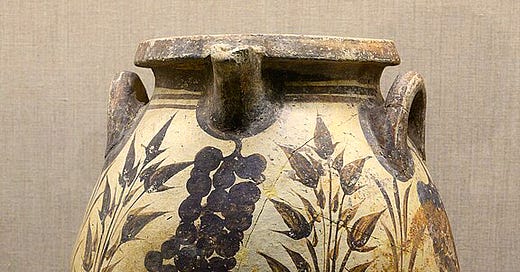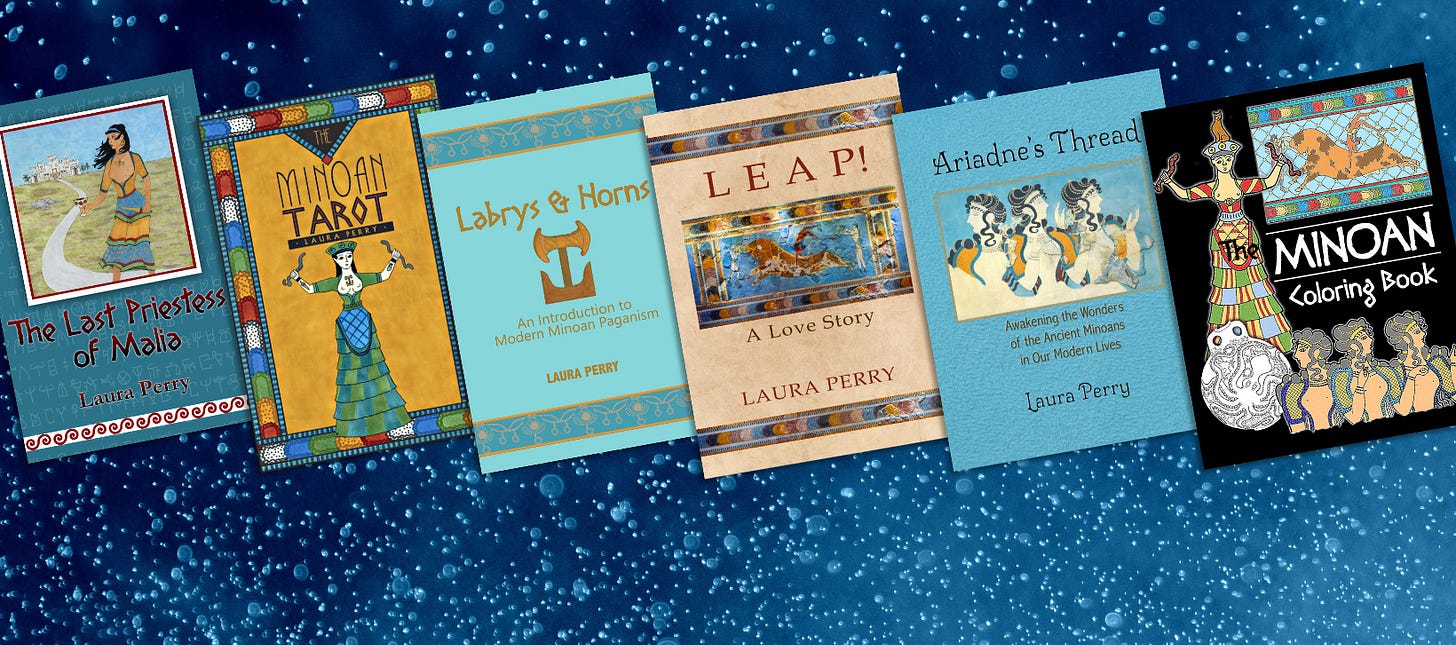The Minoan Deities Are Our Benefactors
Deities and humans in relationship around human activities
This is one of a long-term series of posts about Ariadne’s Tribe style inclusive Minoan spirituality. All my posts about Tribe spiritual practice can be found here. Please feel free to ask questions and request subjects for future posts.
In Ariadne's Tribe, we associate various animals, plants, and objects with our deities: the griffin with Therasia, the staff with Korydallos, geese and white and yellow flowers with Antheia, for instance. These items help us identify the deities in Minoan art. They’re symbols, kind of like name tags or labels. You can find out more about the deities in the Minoan pantheon, including how to pronounce their names, here.
But there's another collection of attributes that we associate with our deities as well.
They indicate a special type of relationship between the deity and us humans, especially humans who work in certain occupations or who take part in particular activities. This isn’t just about our jobs, but about all the things we do.
When we were choosing a term for the deities in this kind of relationship with us mortal humans, we first considered the word patron. But it ultimately comes from the Latin word root for "father.” Even though the word patron is now considered mostly gender-neutral in modern English, we wanted a term that was truly gender-neutral right down to its roots. Eventually we settled on the word benefactor, which comes from word roots that mean doing well or doing good. That’s exactly what the deities help us to do!
So when we're talking about the deities in this type of relationship with us, we refer to them as Benefactors. They provide aid and support for us, helping us in our daily activities and in our relationship with the inspirited world.
We can call on the appropriate Benefactor deity for help in times of trouble and for support at all times to achieve success. But the deities aren’t cosmic vending machines. You don’t put in an offering and out pops a favor. We're in relationship with them, and because of that, the energy flows both ways.
So, for instance, Dionysus is the Benefactor of the grape crop, wine, and wine-makers; no surprise there. And although Therasia isn't the Benefactor of griffins (though I haven't actually asked a griffin, so I could be wrong about that one 😉) she is the Benefactor of the date crop and the people who grow and harvest it, since date palms are her sacred trees.
Let's have a look at our family of deities and find out who's the Benefactor of what:
Rhea: Our Earth Mother Goddess is the Benefactor of potters, those who create beautiful vessels and figurines from the Earth that is her body. She's also the Benefactor of farming, gardening, landscaping, forestry, and all related activities and professions, as well as environmentalists and ecologists. If it's Earth-based, it's hers.
Therasia: The Sun-Mother is the Benefactor of the date crop and those who grow it, as I mentioned above. But metal is also sacred to her, so she's also the Benefactor of metal smiths and their trade. This includes precious metals.
Posidaeja: Grandmother Ocean is the Benefactor of sailors, boaters, and fishers - anyone who spends time in or on the water. Those activities are her domain. She and her sisters together are the Benefactors of ship-builders, Rhea joining in for wooden boats and Therasia for metal ones.
The Serpent Mother: Although language itself belongs to Therasia, the Serpent Mother is the Benefactor of communication, translators, and translations. Her enigmatic ways slither through the changes and shifts between languages, helping us to speak and understand each other. The process of speaking or writing is a very Serpent-y thing because you're taking an idea that's in your mind and converting it into words through which you hope to convey the idea to others. Secret codes and ciphers are also her thing, too, so take note, cryptographers and secret agents!
Ourania: Our beloved Starweaver is the Benefactor of astronomers (both amateur and professional) and astrophysicists as well as astronauts.
Ariadne: As the embodiment of the grain crop, Ariadne is the Benefactor of grain-growing. The Minoans had wheat, barley, and rye, but in the modern world we've expanded her responsibilities to include all the grains that we now grow and use.
Arachne: The Web-Weaver is the Benefactor of all the fiber arts: spinning, weaving, basket making, sewing, quilting, embroidery, knitting, crochet, and so on. Note that dyeing belongs to Potnia Chromaton, since colors are their own kind of magic.
Antheia: Her "thing" is finding beauty in the world, so she's the Benefactor of creativity in general. Not specific crafts or fine arts, but rather, the ability to find the beauty in life and transmit it in the form of your preferred mode of creativity - music, writing, art, oral storytelling, flower arranging, dance, costume design, and so on - whatever you do that expresses beauty. Perfume-making also falls under her purview.
Tauros Asterion: Although the Starry Bull has connections with the cosmos, we've discovered that he's also much more conversant with the material world than some other deities. In particular, he's very helpful in terms of physical activity in the embodied life. So he's our Benefactor of athletes and sports. Also, due to his bovine nature, he's the Benefactor of leatherworkers who use cowhide. Look to the other horned deities for leatherworking with goat and deer hide.
Korydallos: This god is fond of word play and constantly reminds us not to take ourselves so seriously. So he's the Benefactor of humor in all its many forms - as long as it doesn't punch down, of course. Although he loves to laugh, Korydallos is never cruel. So if you're a standup comedian, a comic artist, or a writer of humor, he's your Benefactor for those activities. He's also the Benefactor of word play of all sorts, including poetry, puns, crossword puzzles, and riddles, particularly when that wordplay helps us understand ourselves and the world around us more deeply.
Dionysus: As you might expect, Dionysus is the Benefactor of grapes and grape-growing, fungal fermentation of all kinds, and wine-making in particular, but also mead-making and beer brewing (but not distilling - that activity belongs to Therasia). Although many of our deities are connected with various kinds of ecstatic and trance activities, Dionysus is the main Benefactor for ecstatic dance.
The Minotaur: Our beloved Minotaur is the Benefactor of cattle husbandry, with an emphasis on respect for the animals and their quality of life. This is the case for all the Horned Ones. We've been in relationship with these deities and their sacred animals for millennia. We should show the animals the same respect we accord the deities.
Europa: The Moon-Cow is the Benefactor of bovine dairying and all associated occupations having to do with cow's milk, including cheese-making and the production of other dairy products like yogurt and butter.
The Minocapros: This goat-y god is the Benefactor of goat herding. There's still a substantial goat-herding culture in the mountains of Crete, but people in many places are now raising goats on their own small farms and homesteads. The Minocapros is the Benefactor for those activities.
Amalthea: Known for nursing the Divine Child Dionysus after Rhea gave birth to him in her sacred cave, Amalthea is the Benefactor of all the skills and occupations having to do with goat's milk, from making sure your goats produce plenty of milk to making cheese, yogurt, and butter.
The Minelathos: The deer is the wild animal of the Horned Ones, and the Minelathos is the Benefactor of those who study and protect wildlife, whether that's as biologists or park rangers or activists. (Note that general environmentalism falls under Rhea's purview.)
Britomartis: The Huntress is, of course, the Benefactor of hunters - specifically those who respect the animals and their lifeways and don't waste the bodies of the animals that they hunt. Knowing when to choose not to hunt in order to safeguard the animal populations is an important aspect of this.
Thaena, Sydaili, and Eshuumna: This triplicity of deities has a focus on the metaphoric lenses through which we view the world. They are the Benefactors of justice - not the legal system per se, which often has little to do with real justice - but integrity, honesty, fair play, and the truth that lies behind all things.
Potnia Chromaton: This enigmatic goddess, whose name means Lady of the Colors, is the Benefactor of the color occupations: painters and other artists who work with color, and dyers (who work with fiber arts).
The Melissae: These lovely bee-spirit goddesses are the Benefactors of bees and beekeeping, an occupation that has been associated with the Beloved Dead since ancient times.
Minos: This Underworld God is the Benefactor of divination and diviners, both amateur and professional. This includes all divination methods, regardless of their connection (or lack thereof) with the Minoan world.
Eileithyia: Our midwife goddess, of course, is the Benefactor of midwives - both those who welcome newborn babies into this world and those who help the dying make their transition to the Otherworld.
Hygeia and Asclepius: These two healer deities are the Benefactors of those in the healing professions, both mainstream and complementary/alternative medicine. Herbalism figures large in Hygeia's domain, as does dream incubation in Asclepius's. Generally speaking, Hygeia is the Benefactor of people involved in physical health, and Asclepius is the Benefactor of those involved in mental health.
Daedalus: He's the Benefactor of all the skilled crafts and trades that use the hands but that aren't already covered by other deities. So that means mechanics, woodworkers, inventors, as well as those who tinker and build things as a hobby. Interestingly, he has also shown himself to be the Benefactor of people who create and play video games, perhaps due to the skilled hand activity involved in these games.
Thumia and Kaulo: This pair who embody the joyful aspects of physical existence are the Benefactors of all occupations that involve joyful use of the body as the primary focus, from dancers to certified massage therapists to sex workers.
Zagreus: The Blooming Time Bull who comes wreathed in flowers during the season when life and death intertwine is the Benefactor of the professions that unite the living and the dead: coroners, medical examiners, funeral directors, and similar occupations.
We’re grateful for the Benefactors who aid and support our work, both professional and amateur, and make our lives so much richer.
Together we are joy!
I’m not planning to paywall my Substack, but if my work has meaning and value for you, please consider dropping a little something in my tip jar at Ko-Fi. Thank you!
You can find my books here and my art here and here. I do apologize, but due to unpleasant activity from trolls, I’ve had to limit comments to subscribers only. I hope you understand.
About Laura Perry
I'm the founder and Temple Mom of Ariadne's Tribe, a worldwide inclusive Minoan spiritual tradition. I'm also an author, artist, and creator who works magic with words, paint, ink, music, textiles, and herbs. My spiritual practice includes spirit work and herbalism through the lens of lifelong animism. I write Pagan / polytheist / magical non-fiction and fiction across several different subjects and genres. My Minoan entry in the Moon Books Pantheons series is now available for pre-order and will be released on 26 August 2025. My book of modern Minoan myths is now available in paperback, with the ebook coming soon. I’m also an avid herb and vegetable gardener and living history demonstrator.







What I’d give for a statue of Britomartis for my altar at home.